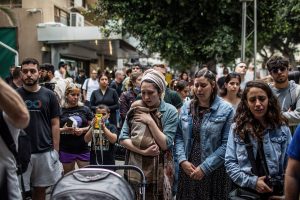
It’s Passover. Besides being the holiday of freedom from enslavement, there is a custom to wear something new on Passover. It is one of those times in the year when we try to bring something new into our lives. Indeed, there is a lot we would like to renew in the Israeli society. Division is deepening, hatred between the factions of society is intensifying, corruption and violence abound everywhere, divorce rates are soaring and families that still survive are struggling, and the relationship with our Arab neighbors is (literally) explosive. And while everyone wants to become prime minister and promises to solve everything, the reality proves that no one has any idea. So what novelty can we offer ourselves that will really make things better?
The “novelty” we need is actually to return to our roots, the roots of our people, the basis on which our nation was established. Any nation can live however it chooses. We, too, chose a long time ago, and as long as we stick by our choice, we are happy. When we veer off from it, this is when trouble begins.
Our choice began when Abraham, the father of our nation, wanted to understand what was going on around him. He was an inquisitive man, and in Babylon, where Abraham had lived, people’s egos were flying through the roof. People stopped understanding one another and became violent and belligerent, as the book Pirkei de Rabbi Eliezer writes, “half the world died there by the sword.”
Abraham realized that existence is possible only through complementarity and connection among people, that otherwise people will destroy one another. He understood that nature had created us different not so we would fight against each other to the death, but so we would complement one another and benefit from our connection.
Abraham explained what he had found to everyone around him. People who sympathized with his ideas joined him and formed a community that Maimonides referred to as “the people of the house of Abraham” (Mishneh Torah, Chapter 1). That was the origin of the Jewish nation. As time went on, our leaders and sages polished the teaching but remained true to the principle of differences that complement one another and thereby create a stronger bond than was possible had it not been formed by rising above disputes. King Solomon articulated this principle in the verse, “Hate stirs up strife, and love will cover all crimes” (Prov. 10:12).
The principle of unity above division and dispute is unique. Until then, and since then, humanity’s default behavior was that when there is a dispute, a fight erupts and the winner imposes its way and will on the loser.
Because Israel were the only ones who had conceived a different conduct, and for some of the time even carried it out, they were commanded to spread the information about their way to the rest of the world. They committed to the law of unity at the foot of Mt. Sinai, where and when they committed to unite “as one man with one heart,” and they were promptly commanded to be “a light unto nations,” namely to set an example of unity and love of others.
This is our ancient root, the choice that had made us into a nation. Until we return to it, we will not know peace and happiness in our country.
Since those ancient days, we have deviated very far from our core principle. To return to it, we must facilitate an educational process that will put us back on track toward unity above division. We should not suppress our differences or hide them, but determine that above our different political, social, cultural, and all other differences, we place a canopy of unity, that unity is the supreme value, and everything else is secondary to it.
Just as the children of Israel were redeemed from Egypt when they united under Moses, just as they achieved their nationhood when they united as one, we must realign ourselves with our ancestors and become an example of unity for all the nations.
Passover symbolizes passing over from enslavement to freedom. It is time we freed ourselves from hate and liberated it by wearing something new for Passover: love of others, the motto of our nation.
#passover #israel #lovethyneighbor
Posted on The Times of Israel, Facebook